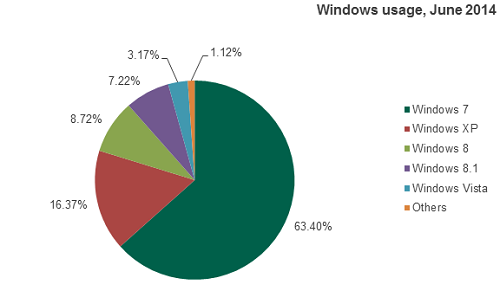More than 16% of all PC users who agreed to provide data to the distributed global Kaspersky Security Network were still working on computers running Windows XP in June 2014.
More than 16% of all PC users who agreed to provide data to the distributed global Kaspersky Security Network were still working on computers running Windows XP in June 2014. This fact carries potential implications for information security. This number was part of the findings from the "Windows usage and vulnerabilities research" carried out by Kaspersky Lab experts in the summer of 2014.
Users whose computers run under a dated operating system or have out-of-date versions of installed software risk coming under attack from malware that exploits vulnerabilities.

The study also looked at individual countries to assess the proportion of Windows XP users among all users of Kaspersky Lab's Windows-based products in each country. Vietnam was the leader, with 38.79% of users still preferring to work under Windows XP. Next came China with 27.35%, India with 26.88%, and Algeria with nearly a quarter (24.25%) of users still remaining loyal to the legendary operating system. Roughly one in five computers protected by a Kaspersky Lab product still runs under Windows XP in Italy (20.31%) and Spain (19.26%). A smaller proportion of users – 4.52% continues to use Windows XP in the USA.
| Vietnam | 38.79% |
| China | 27.35% |
| India | 26.88% |
| Algeria | 24.25% |
| Italy | 20.31% |
| Spain | 19.26% |
| Russian Federation | 17.40% |
| France | 12.04% |
| Germany | 8.54% |
| United States | 4.52% |
The long-playing XP, the accelerating Windows 8.1
Although technical support for Windows XP users was only discontinued in April 2014, the sales of this operating system finished back in 2010. This, however, did not have much effect on its popularity: according to Kaspersky Lab data in June 2011, a year after the end of sales, 48.86% of users were still using Windows XP. After another year, in June 2012, there were 35.64%, and in June 2013, 25.42% of Windows XP users. Stated differently, the popularity of Windows XP decreased roughly by 10 percentage points each year. Interestingly, that decline was not greatly affected by external events which could potentially have accelerated it, such as the release of Windows 8.1 in October 2013 or the discontinuation of the extended Windows XP support: in November 2013, there were 21.42% XP users; by June 2014 the number fell to 16.37%, which makes a 5.05 percentage points' decline, or roughly a half of the total annual decline in XP’s popularity.
In contrast, Windows 8.1, the newest Windows operating system to date, had a 7.22% market share in June 2014. This result is 1 percentage point better than its precursor Windows 8 had at the equivalent stage: from late October 2012 to June 2013, Windows 8 was installed on the computers of 6.22% of Kaspersky Lab product users. The improved take-up rate for Windows 8.1 may be partly related to the fact that Windows 8 was the first Microsoft operating system which supports upgrades to new versions with an embedded upgrade client via the official Windows app store. Besides, Windows 8 users had a free option to upgrade to Windows 8.1, which also played a role in how fast the new version was adopted.
If we look at individual countries in terms of how many users have upgraded to the new system, the leaders are the USA (16.27%), Canada (13.52%), Germany (11.17%), the United Kingdom (10.79%) and France (10.31%). The outsiders are Italy (8.1%), Russia (5.14%) and India (2.91%).
"The Kaspersky Security Network statistics show that the XP epoch is finally coming to its end. However, a sizeable proportion of users still run this aging operating system. Its maintenance has been discontinued by Microsoft, which means that the manufacturer will no longer release security updates or patch vulnerabilities which may still exist in the system. Should virus writers find such a vulnerability, XP users will come under threat," said Vyacheslav Zakorzhevsky, Head of Vulnerability Research Team at Kaspersky Lab.
Protection technologies
To minimize the risk of encountering attacks involving vulnerabilities, Kaspersky Lab's experts recommend that users update their software regularly and use a reliable security solution equipped with technologies to counteract exploit attacks.
These technologies are incorporated in Kaspersky Lab's home user products - Kaspersky Anti-Virus, Kaspersky Internet Security Multi-Device and Kaspersky PURE - as well as in corporate user solutions: Kaspersky Small Office Security and Kaspersky Endpoint Security for Business.




